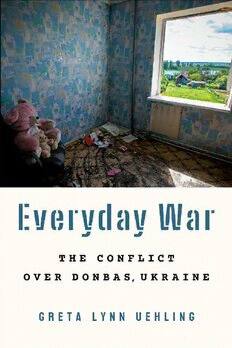
Everyday War: The Conflict over Donbas, Ukraine PDF
Preview Everyday War: The Conflict over Donbas, Ukraine
EVERYDAY WAR EVERYDAY WAR The Conflict over Donbas, Ukraine Greta Lynn Uehling CORNELL UNIVERSITY PRESS ITHACA AND LONDON Copyright © 2023 by Cornell University All rights reserved. Except for brief quotations in a review, this book, or parts thereof, must not be reproduced in any form without permission in writing from the publisher. For information, address Cornell University Press, Sage House, 512 East State Street, Ithaca, New York 14850. Visit our website at http://c ornellpress. c ornell. e du. First published 2023 by Cornell University Press Printed in the United States of Amer i ca Library of Congress Cataloging- in- Publication Data Names: Uehling, Greta Lynn, author. Title: Everyday war : the conflict over Donbas, Ukraine / Greta Lynn Uehling. Description: Ithaca : Cornell University Press, 2023. | Includes bibliographical references and index. Identifiers: LCCN 2022016914 (print) | LCCN 2022016915 (ebook) | ISBN 9781501767593 (hardcover) | ISBN 9781501768484 (paperback) | ISBN 9781501767609 (pdf) | ISBN 9781501767616 (epub) Subjects: LCSH: Ukraine Conflict, 2014—Social aspects. | War and society— Ukraine—History—21st century. | DoneEFʹka oblastʹ (Ukraine)—Social conditions—21st century. | Luhansʹka oblastʹ (Ukraine)—Social conditions— 21st century. | Russia (Federation)—Foreign relations—Ukraine. | Ukraine—Foreign relations—Russia (Federation) Classification: LCC DK508.852 .U33 2023 (print) | LCC DK508.852 (ebook) | DDC 947.7086—dc23/eng/20220527 LC record available at https://lccn.loc.gov/2022016914 LC ebook record available at https://lccn.loc.gov/2022016915 This book is dedicated to my students at the University of Michigan: past, pre sent, and future. When the rich wage war, it’s the poor who die. —J ean-P aul Sartre, Le diable et le bon dieu Contents Preface ix Acknowl edgments xiii List of Abbreviations xv Note on Transliteration xvi Introduction: Everyday War 1 1. “Now We Have Funeral a fter Funeral”: The Conflict over the Conflict in Donbas 18 2. Welcome to Café Patriot! Militarization and a Themed Café 33 3. Interpersonal Peace: The Micropolitics of Friendship 52 4. Home Fronts: Romantic Partnerships and Families during War 75 5. Boots, Gloves, and Tactical Kinship: Everyday War 92 Intertext: “I Need a Peaceful Sky” 109 6. Praying to be Killed at Once: Ways of Coping with Military Vio lence 111 7. Everyday Sci- Fi and Practical Orientalism 123 8. The Volunteer Body Collectors of Ukraine: Outsourcing Undertaking and Smuggling Pediatric Insulin 141 9. Concluding Thoughts 158 Intertext: “I Realize that Nothing Will Be the Same Again” 163 Appendix: Pseudonyms of Interviewees 165 Notes 167 References 171 Index 187 Preface This book explores the conflict over the eastern Ukrainian provinces of Donetsk and Luhansk. The chapters that follow are part of a larger effort to understand the subjective experience of war and forced displacement. I aim to bring these experi- ences, which are not incidentally the experiences of an increasing percentage of the world’s population, to my undergraduate students as well as other readers. The book is intended to provide an accessible lens through which to grasp something of what noncombatant civilians go through in a war zone: for as long as t here are armed conflicts, we need to grasp more concretely and realistically what they are all about. I carried out the research for this book as a Fulbright scholar in Ukraine be- tween the years of 2015 and 2017. As a Fulbright scholar, I was fortunate to have a grant that enabled me to fulfill my teaching obligations at the University of Michigan during the academic school year and do fieldwork in the summer months. On three consecutive trips of two months each, I visited shelters for the internally displaced, attended workshops intended to help forced mi grants ad- just to their new circumstances, and completed many interviews, crossing the country repeatedly to talk to as many people as I could. This proj ect almost did not get off the ground. My proposal to the Fulbright foundation had laid out a plan to investigate the relationship between public com- memoration of the past and ethnic tolerance in Crimea. That book w ill have to wait b ecause while my proposal was being considered by the Fulbright foundation, something my Crimean Tatar friends had been warning me about since the mid- 1990s happened: Crimea was occupied by the Rus sian Federation. This prevented me and most other foreigners from traveling to Crimea. The Fulbright foundation generously suggested I carry out research anyway. With many of my Crimean Tatar friends and colleagues having fled the peninsula for their safety, and having carried out multiple research proj ects on forced migration in a variety of settings in the past, it made sense to shift my focus to the forced migration resulting from the 2014 attempted annexation of the Crimean peninsula and the population dis- placement from the eastern provinces of Donetsk and Luhansk. I embarked on this proj ect, then, having previously completed other ethno- graphic fieldwork in former Soviet republics. In the late 1990s, my dissertation research was concerned with the repatriation of the Crimean Tatars, who w ere deported from their historic homeland in Crimea to the Urals and Soviet Central ix
